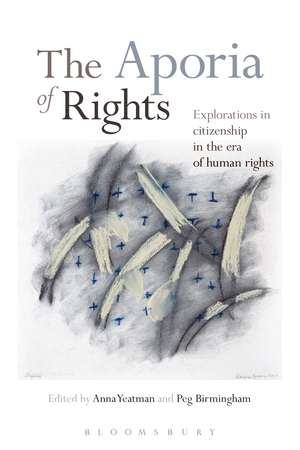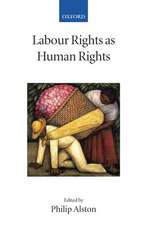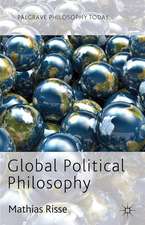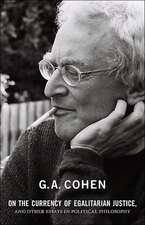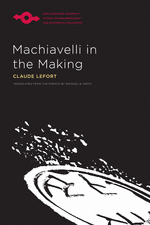The Aporia of Rights: Explorations in Citizenship in the Era of Human Rights
Editat de Professor Peg Birmingham, Anna Yeatmanen Limba Engleză Hardback – 19 noi 2014
| Toate formatele și edițiile | Preț | Express |
|---|---|---|
| Paperback (1) | 257.68 lei 6-8 săpt. | |
| Bloomsbury Publishing – 4 mai 2016 | 257.68 lei 6-8 săpt. | |
| Hardback (1) | 715.73 lei 6-8 săpt. | |
| Bloomsbury Publishing – 19 noi 2014 | 715.73 lei 6-8 săpt. |
Preț: 715.73 lei
Preț vechi: 1028.38 lei
-30% Nou
Puncte Express: 1074
Preț estimativ în valută:
136.100€ • 148.86$ • 115.15£
136.100€ • 148.86$ • 115.15£
Carte tipărită la comandă
Livrare economică 21 aprilie-05 mai
Preluare comenzi: 021 569.72.76
Specificații
ISBN-13: 9781623569778
ISBN-10: 162356977X
Pagini: 280
Dimensiuni: 152 x 229 x 25 mm
Greutate: 0.54 kg
Editura: Bloomsbury Publishing
Colecția Bloomsbury Academic
Locul publicării:New York, United States
ISBN-10: 162356977X
Pagini: 280
Dimensiuni: 152 x 229 x 25 mm
Greutate: 0.54 kg
Editura: Bloomsbury Publishing
Colecția Bloomsbury Academic
Locul publicării:New York, United States
Caracteristici
COVERAGE - Unique in its broad coverage of the issue of citizenship and human rights
Notă biografică
Anna Yeatman is a Professorial Fellow in the Whitlam Institute at the University of Western Sydney. She is a political and social theorist who also has practical experience in public policy. Peg Birmingham is Professor of Philosophy at DePaul University, USA. She is the author of Hannah Arendt and Human Rights (2006) and co-editor (with Philippe van Haute) of Dissensus Communis: Between Ethics and Politics (1995).
Cuprins
Contributors AcknowledgmentsChapter 1 Introduction Anna Yeatman Chapter 2 "Perplexities of the Rights of Man": Arendt on the Aporias of Human Rights Ayten GündogduChapter 3 The Multivocity of Human Rights Discourse Jeff MalpasChapter 4 Neither Here Nor There: The Conceptual Paradoxes of Immigrant and Asylee Resistance Robert W. GloverChapter 5 Acts of Emancipation: Marx, Bauer, and "The Jewish Question" Charles BarbourChapter 6 Must democratic rights serve the rights-bearer? The right to vote of people with severe cognitive impairments Ludvig BeckmanChapter 7 Performing Human Rights: the meaning of rights in the ASEAN Intergovernmental Commission on Human Rights Anthony J. LangloisChapter 8 The politics of indigenous human rights in the era of settler state citizenship: Legacies of the nexus between sovereignty, human rights and citizenship Danielle CelermajerChapter 9 Revolutionary Declarations: The State of Right and the Right of Opposition Peg BirminghamChapter 10 Humanising Militarism: Amnesty International and the Tactical Polyvalence of Human Rights Discourses Jessica WhyteChapter 11 Rival Doctrines - the politics of human rights Anna YeatmanChapter 12 Afterword Peg BirminghamConsolidated BibliographyIndex
Recenzii
Tackling head on one of the most challenging, perplexing, and yet essential political relationships of our time, this collection is a must-read for those of us-political scientists, philosophers, sociologists, historians, lawyers-who work with, around and even against the aporetic connection between human rights and citizenship.
'What is unprecedented is not the loss of a home but the impossibility of finding a new one.' Hannah Arendt thought that most of those who have to insist on their rights lack the precondition of even universal rights, a place to call home. Refugees, boat people, sans papiers and more are still in this situation. Also, others, very much at home, are bought and sold into imprisonment like chattel in a new institutional setting of private prisons and debt collections. Human rights talk abounds but on the ground rights require a fast diminishing public infrastructure to secure their bearers from arbitrary violence and illegitimate force. This volume deepens our thinking about human rights and their paradoxes at a time when such rethinking is sorely needed.
This is an important contribution to the human rights literature, that successfully blends theoretical and empirical pieces and critical and explanatory approaches. A must read for anyone who takes rights seriously.
'What is unprecedented is not the loss of a home but the impossibility of finding a new one.' Hannah Arendt thought that most of those who have to insist on their rights lack the precondition of even universal rights, a place to call home. Refugees, boat people, sans papiers and more are still in this situation. Also, others, very much at home, are bought and sold into imprisonment like chattel in a new institutional setting of private prisons and debt collections. Human rights talk abounds but on the ground rights require a fast diminishing public infrastructure to secure their bearers from arbitrary violence and illegitimate force. This volume deepens our thinking about human rights and their paradoxes at a time when such rethinking is sorely needed.
This is an important contribution to the human rights literature, that successfully blends theoretical and empirical pieces and critical and explanatory approaches. A must read for anyone who takes rights seriously.
